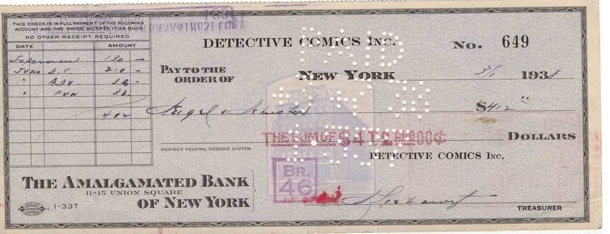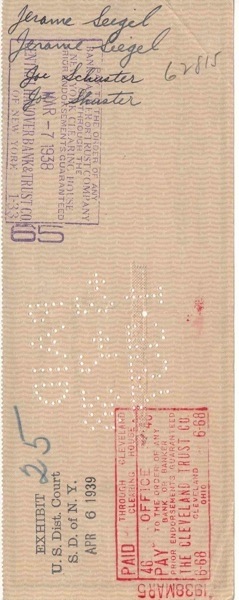Compared to “locating the apple core somewhere deep in the Garden of Eden” by Tom Spurgeon, the original check that bought the rights to Superman for $130 has been located, possibly as part of a Comics Connect auction of memorabilia from the Jerry Siegel estate.
The 1938 check, signed by National’s Jack Liebowitz, shows payments of $282 for various stories contributed to Detective Comics, Adventure Comics and More Fun Comics, and $130 for Superman. By signing the check — which didn’t even spell their names right — Joe Shuster and Jerry Siegel sold off the rights to their one great creation and initiated a legal battle that lasts until this day.
Scans of the check first emerged yesterday in a tweet by writer Gerry Duggan.
Comic Connect wrote more about the check:
On May 24 1626, Peter Minuet bought an island for $24 worth of goods. That island later became known as Manhattan.
On December 19, 1919, the New York Yankees bought a baseball player from the cash-strapped Boston Red Sox. That player was Babe Ruth.
On March 1 1938, DC Comics gave two young men from Cleveland $130 for the rights to a comic character named Superman. That $130 check essentially created a billion dollar industry and set in motion nearly 70 years of legal battles that continue to this day.
Much has been made of the original 1938 $130 payment to Jerome Siegel and Joe Shuster. Did DC Comics take advantage of two eager young men looking for their big break in the comic business or was this unequivocally fair business practice between comic book writers and publishers in a 1938 America? Whatever you believe, the $130 check is the quintessential symbol of this debate for the ages.
But whatever happened to the check? The consensus has always been that this 1938 check had been simply lost to time. Thrown out by some DC employee without a second thought. Or so it had been thought. . . .
The check exists!This March 1, 1938 Detective Comics check, signed by Jack Liebowitz is made payable to Jerome Seigel and Joe Schuster. (You would think that the payment for a character as important as Superman, DC would have spelled Siegel and Shuster’s name correctly!) The check, in the amount of $412, includes an accounting of the items being paid for. At the very top is “Superman $130,” Next is the payment for the June 1938 Detective Comics at $210. Following that are payments of $36 each for Adventure Comics and More Fun. It would also appear that DC Comics used this check as evidence in their 1939 lawsuit against Victor Fox, given the fact that the evidence stamp from this case is clearly visible on the reverse of the check, as are the actual endorsement signatures of Siegel and Shuster themselves.
The final clincher is that the check exactly matches the signed agreement between DC and Siegel and Shuster, which transfers to DC “exclusive right to the use of Superman “in consideration of $130.” The date of this agreement is March 1, 1938. The same date as the check.
While none of the materials that have come to light yet explain where the check came from, it would be logical to expect it had been found in Siegel’s estate. Siegel’s widow, Joanne, died earlier this year, so the rest of the Siegel items — including a typewriter a script, clothing, and locks of his hair — probably stem from the dissolution of her estate.
Looking upon the images of this check inspires both awe and revulsion. Awe that such a key part of American cultural history has been found. Revulsion that the American comic book industry was birthed in exploitation of the creators. And before anybody gets up in the comments to complain about “the greedy family,” know that buying all rights in perpetuity was not necessarily the standard even in 1938. Bob Kane’s family made sure he held on to a piece of Batman a few years later, for instance. Jack Liebowitz was a hard nosed businessman by any account, and the US Copyright Office is thought to have taken the Superman case into account when they revised the work for hire law in 1976 to prevent further abuses.
Among the announced items in the auction, Siegel’s favorite suit:
The bell-bottomed styling betrays a ’70s origin for this, and one can picture Siegel — in his favorite shirt and tie, also in the auction — as he appeared at many ’70s comics events, when the battle for even credit on Superman was being fought. As anyone who has ever done so can attest, going through the belongings of a dead person is the most depressing activity on earth.
You can’t take it with you.
But you can leave some ideas behind.
Even if all you sold them for was $130.











i dont think the heirs are being greedy, nor do i think siegel and shuster were exploited. its all just business.
Belongs in the smithsonian and not in a private collection. Will be interesting to see who wins it if we are even allowed to see.
A monumental plethora of ethical abuses have been let off the hook with the lame alibi, “It’s just business.” No, it isn’t.
I don’t understand the motivations of anyone who sides with the corporations on this or the Kirby suit.
I mean, why?
adjusted for inflation $130 in 1938 is ~$2000 now. on the list of injustices in the world, paying 2 kids $2000 for the perpetual rights to a character is pretty far down.
but im not taking ‘sides’ with anyone. i dont care who owns superman.
Partly, it’s due to thinking that they were responsible for their own business decisions, good or bad.
And, in part, it’s due to the legal principle that fictional characters can’t be copyrighted separately from the stories which they appear in. That happens with comics characters because as visual designs, they look neat, can be merchandised, and are associated with the stories. But from a storytelling standpoint, a hero is only an element in a story, and even if he and his fictional history are the starting points for one, work still has to be done to produce a publishable story. Arguing that an artist who created _____ deserves to be paid for the use of him by others elevates the idea for the character above the story as a whole. A strong argument can be made that the Kirby estate deserves partial ownership of the copyrights for the stories that he worked on, but going beyond that gets trickier. Mounting a convincing legal argument might be easier than mounting a convincing logical one.
SRS
I don’t think there was such a thing as buying all rights in perpetuity then. There was still the idea of public domain.
I have a question that’s probably none of my business but I’ll ask it anyways because this auction is ringing alarm bells in my head.
Why is Laura Siegel selling this stuff? Is it that she wants to sell it or is the money DC agreed to pay Siegel and his wife in the 70s not being passed down to Laura? I don’t know of the exact wording of the 70’s deal so I’m not sure if it’s supposed to carry on to Laura or not. But considering the legal situation I could totally see Time Warner not paying it if it were, forcing her to legally fight for it. Corporations often take an “every possible straw” tactic in hopes of eventually breaking the camels back and get a cheap, favorable settlement.
I’m concerned as Joanne Siegel’s last letter mentioned Laura having some health issues. I hope it’s not a case of her having to sell this stuff because of a lack of money/health coverage and medical needs.
I think it’s disgusting Siegel and Schuster were ripped off so badly. I think it’s horrendous what happened to Jack Kirby. And I think it’s abhorrent what WB has done to Alan Moore over Watchmen and V. I don’t understand comic fans who side with the companies on any of this stuff.
I don’t think it’s a secret that one of the tactics used by large companies with a large war chest in any kind of litigation is to simply drain the other side of as much resources as possible by delaying and extending the court process as much as possible.
The lesson here is that all creators should understand the value of legal representation. Having said that, the publisher and WB should recognize the ethics of the situation and admit that two boys were totally taken advantage of. Sadly, revenues too often blind the ethical perspective.
@Jamie Coville–
This is not to say Laura Siegel DOESN’T have this check, but given that it was DC’s check, Siegel and Shuster signed it, and it was returned to DC/DC’s bank.
So then if the Siegel family has it, does anyone know how they got it?
Or is someone else auctioning it off?
And @Chris Hero and others–
By no means do I think that Siegel and Shuster were treated fairly after the immense success of Superman. I think that DC should have built them gold-plated houses and furnished them with everything they ever asked for, given that so much of DC’s success was due to something they’d created. I think it was incredibly short-sighted from a PR standpoint and downright awful from a humanist standpoint that DC allowed those two men to wither away.
That would be the ethical thing to do. But of course corporations aren’t bound by ethics, as all of us who are citizens of the United States of Petroleum are aware. And so I think one can argue that DC is legally entitled to expect a deal to be honored, even if that deal is shitty and unethical.
I think hindsight is confusing here, too–S & S were two kids in 1938, and they probably assumed they’d come up with dozens of better ideas than Superman. DC no doubt made many of these deals with creators of properties that went nowhere, and the gamble paid off for them, but not for the creators. A shitty deal, but a deal nonetheless.
The fortunate thing is that modern contracts are not so lopsided. The history of comics and music are particularly riddled with corporations making out like bandits while artists starved, but as modern production/distribution has fallen more into the hands of the artists, the contracts have shown vast improvement.
ahem–
edit “That would be the ethical thing to do” originally followed “built them gold houses, etc.”, then I added “allow them to wither away”. So for clarity’s sake, please let me explain that I don’t mean that it would be ethical for DC to allow them to wither.
They should have been lionized.
C’mon Gary Groth… Do something Awesome
:This is not to say Laura Siegel DOESN’T have this check, but given that it was DC’s check, Siegel and Shuster signed it, and it was returned to DC/DC’s bank.
So then if the Siegel family has it, does anyone know how they got it?:
The back of the check is stamped with U.S. District Court markings. Perhaps it was obtained as evidence during one of the suits that the Siegels were involved in?
Not on either side of this.
I do wonder how many $130 checks were spent over the years on ideas that did not pan out to other creators?
How much is related to the originators work and how much by those who followed and the marketing of the company?
Curtis Burga has a good question. How did they get the check back?
What this proves to me is that people in the present are smarter than people in the past. Therefore, I am smarter than Abraham Lincoln.
re: “I think that DC should have built them gold-plated houses and furnished them with everything they ever asked for”
Lord save us from the hippies. Lets all have a big fucking love in while we’re at it and forget that they sold something and were paid for it. Grow the fuck up dude. It’s a business. It’s not supposed to be fair or nice. It’s about making money. Go build your own gold houses moron.
I have the utmost sympathy for them and thought they should have been far better compensated than they were, if just as a show of good will.
But on the other hand, no one forced them to sell the rights and I’m not entirely sure making a bad business decision is a cause for moral outrage.
The business with Captain Marvel, on the other hand….
Allen R. –
You are not smarter than Abraham Lincoln.
“Lord save us from the hippies.”
Why? Did they smoke your secret stash, dude? Seems to me that there’s a world-wide protest against rich robber barons going on; maybe you missed it since it’s getting woefully inadequate mainstream news coverage.
“What this proves to me is that people in the present are smarter than people in the past.”
Not really. It’s probably the reverse, since the planet is now far more populated, and some people now live long into their general senility.
“But on the other hand, no one forced them to sell the rights…”
Sure, because total starvation seemed like such a viable option back then. Get real.
“Sure, because total starvation seemed like such a viable option back then. Get real.”
Right. Because you were there and saw them starving, right? Oh wait…you mean you read something once about it? Thought so.
Wasn’t it common knowledge even in the late 30s that being an artist wasn’t a real job? Yeah, that was a rhetorical question. It wasn’t. They had something, they sold it, they were paid. End of story. Grow up Jr.
“Seems to me that there’s a world-wide protest against rich robber barons going on; maybe you missed it since it’s getting woefully inadequate mainstream news coverage.”
Oh yeah, I watched it. I laughed just as hard at that as I did at your comment. Now why don’t you go back to picketing outside of WalMart or something.
Huh. What a surprise that a guy who chooses an anonymous internet handle that sounds like a gas station prophylactic turns out to be such a prick.
Thanks for stopping in, Tingler. Looking forward to your trenchant analysis in the future. However, next time you might want to read the things you’re commenting on before shitting out your silly little insults; had you done so, you might have seen that my point was exactly that it IS a business, and that a contract’s a contract.
If someone offered you $2000.00 for one of many ideas you we’re churning out that may or may not go anywhere, most people even today would jump all over that. You high and mighty folks screaming about those “poor exploited kids” don’t live in the real world. To come back later, after selling the rights and demanding more money for an idea that happened to pan out is ludicrous. They made the deal with eyes wide open. They knew the consequences and if not, then it was a good lesson for them. Of course it’s sad but get over it..a deal is a deal.
All this of course is an even more simplistic discussion than the usual comic book plot. Siegel and Shuster sold what they thought were the comic book rights to Superman for 28 years.
They also renegotiated the contract shortly thereafter and were paid lots of money- 50% of the comic strip profits, merchandising, royalties, etc. But Siegel never actually got along with Liebowitz or anybody else at DC. It was a strained relationship from the beginning. The fight over Superboy was the final straw which resulted in the lawsuit being filed asking for the rights back. They finally got paid for Superboy as a result but DC cancelled their contract and took their royalties away. Pure retaliation if you ask me. When the 28 year copyright was up Siegel and Shuster applied for the renewal just like Joe Simon did for Captain America. There was no precedent for this sort of thing so no one really had any idea what would happen. DC fought, Marvel settled. Then DC “settled” and reneged on the settlement. It’s a lot more complicated than the back of one check. (which doesn’t have the infamouse disclaimer on it I notice.)